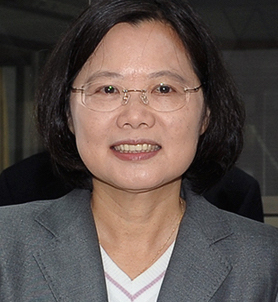HONKONG (INPS | Pressenza) – Taiwan News reporting on Democratic Progressive Party (DPP) presidential candidate Tsai Ing-wen’s landslide win says the good lady promises reforms, general cooperation and an aim to establish stability after she was elected Taiwan’s first woman president on January 16.
Tsia got the highest percentage of the vote any candidate has ever had since such direct presidential elections were first held in 1966.
Also, at the same time, she can also look forward to the first-ever absolute majority the DPP has ever held in the 113-seat Legislative Yuan – parliament. At this juncture it seems the DPP could hold a total of 68 seats.
According to official results, Tsai won about 6.87 million votes or 56.15 percent; while the Kuomintang Chairman Eric Liluan Chu received 3.79 million votes or 31.01 percent; and People First Party Chairman James Soong got 1.57 million votes or 12.82 percent of the vote.
At her internationally broadcast news conference same day in the evening, Tsai emphasized democracy. “In 2016, through democratic elections, we showed the whole world that we are proud of being a democratic country.” The president-elect stated, adding that she would be working on a framework to discuss national issues with other parties.
On China Tsai said she would take general public opinion as the basis for dealing with cross-straits relations while at the same time seeking the widest possible cross-party consensus. “Both sides of the Taiwan Straits bear the responsibility to make the utmost effort to seek an equal way of respectful interaction in order to guarantee there is no provocation, no accident,” she said.
“The democratic space needs to be respected, and any form of suppression will damage the stability of cross-straits relations,” said Tsai – who has promised voters and to the international community that she would maintain the status quo as is today.
During QA time she replied to a question from an overseas reporter emphasising that Taiwan would stand by its claims of sovereignty over the Japan disputed Diaoyutai Islands and over islands in the South China Sea, while respecting international agreements.
Addressed the waiting crowds she declared: “Taiwan equals democracy, democracy equals Taiwan,” and “Tonight, we can celebrate, but when the sun rises tomorrow, we must take up the responsibility for reforms.”
Tsai has not endorsed the principle that Taiwan and China are parts of a single nation to be unified eventually, which Beijing has made its baseline for continuing negotiations that have produced a series of pacts on trade, transport and exchanges.
Though called the independence party she passed over any such reference on this day of her outright win. However, her win will introduce new uncertainties in the complicated relationship between Taiwan and mainland China.
In Hong Kong the result is being celebrated widely as the status quo of Taiwan vis a vis mainland China is a hot topic locally, where the Taiwan flag is banned.
Meanwhile, mainland China’s official news agency Xinhua reported on January 16 that the foreign ministry in Beijing had urged the international community to continue to abide by the one-China principle after the Taiwan leadership election.
“We hope and believe that the international community will adhere to the one-China principle, oppose ‘Taiwan independence’ in any form and support peaceful development of cross-Strait relations through concrete actions,” Foreign Ministry spokesperson Hong Lei said in response to questions on Taiwan-related diplomatic situation in the future.
The Taiwan question falls in China’s internal affairs, said Hong. There is only one China in the world, and both the mainland and Taiwan belong to one China, he said, adding that China’s sovereignty and territorial integrity brook no division.
The result of Taiwan leadership election will not change the basic fact or the consensus of the international community, the spokesperson said.
The Chinese government sticks to the one-China principle, opposes “Taiwan independence”, “two Chinas”, “one China, one Taiwan,” he said, adding that this stance remains unchanged and will not change no matter what happens in Taiwan.
On the key issue of safeguarding national sovereignty and territorial integrity, the Chinese government is rock-firm and will never tolerate any secessionist activity of “Taiwan independence”, Hong said.
*With additional reporting by INPS Beijing correspondent. Tony Henderson is a freelance writer working in Hong Kong, since 1980, and previously Japan, for seven years following two years in Mauritius after a year in Libya. Long time participant in the Humanist Movement and spokesman for Universal Humanism in Hong Kong. Also, Pressenza Hong Kong Bureau Chief. This article appeared first in Pressenza is being reproduced in the framework of content partnership. [International Press Syndicate – 17 January 2016]
Photo: Tsai Ing-wen Credit: Wikimedia Commons | Chen Chun-lin

